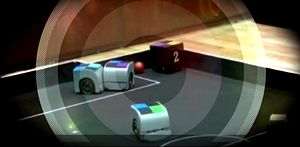Although many parts of the world are excited about the ongoing World Cup, people in North Korea remain blind. The country’s state media outlets are not giving much coverage of the matches, unlike other global media.
Instead, they have decided to report something similar but very different: a robot soccer match.
According to a video clip by North Korean propaganda website DPRK Today, North Korea recently held a robot soccer tournament for university students.
A team from Kim Chaek University of Technology topped the tournament with the final score of 5 to 1. It was followed by Pyongsong Coal Industry University, and Han Duk Su Pyongyang University of Light Industry placed third.
Around the world, companies are advancing autonomous technologies, with the car industry leading the trend, in particular. The autonomous vehicles market, for example, will enjoy an annual growth rate of about 42 percent by 2022, according to India-based research firm Orbis Research.
Hosting a robot soccer tournament is the latest indicator of North Korea’s desire to catch up with that trend. The same technologies used to create soccer-playing robots are stepping stones to advanced autonomous skills.
In addition, the fact that the tournament was for university students hints that research on autonomous technologies is being conducted at the wider-level of institutions in North Korea, not just by the government.
So what are these students studying and how far they have come? A school newspaper from North Korea’s most prestigious university Kim Il Sung University has a clue.
Kim Il Sung University’s school paper reported, in its 12th edition of 2017, that the university is studying how to measure distance and to recognize obstacles when running autonomous robots.
In particular, it studies motion picture instruments and laser distance meters and machines to combine image information and distance information, according to the paper.
The school paper also noted that studying autonomous technologies has become a global trend.
“Development of autonomous technologies requires high levels of artificial intelligence knowledge in addition to knowledge in mechanical, electronic, wireless, and computer science [technology]. Already, many countries around the world actively develop and apply different types of autonomous technologies to everyday life, including tourism and education industries,” the paper said.
Another interesting information is the name of a reference material. The paper said students at Kim Il Sung University are studying autonomous technologies by referring to a book called “Intelligence Robot Engineering for Autonomous Technology.” This might be a translated version of a foreign book or could be written by a North Korean author. Either way, it indicates that North Korean university students can get hold of necessary books for their studies.
Some say, however, North Korea’s move to advance autonomous technologies is not necessarily a good thing for South Korea. Critics are wary of the possibilities of such technologies to be used to develop an unmanned reconnaissance plane, rather than being applied to tourism or education sectors as the Kim Il Sung University newspaper suggested.
Given the fact that there have been numerous alleged attempts from North Korea to spy on South Korea with such airplanes, the concern seems to be valid.
Without military satellites, North Korea has focused on utilizing unmanned reconnaissance planes in order to monitor the South. It is estimated that North Korea owns between 300 and 400 unmanned reconnaissance planes, but most of them are second-hand and outdated models from the Soviet Union, Russia, and China.
Although North Korea seems to have been able to achieve some progress in improving the hardware of such planes over the past few years, its software development is still in question. For instance, an unmanned reconnaissance plane from North Korea that crashed in the South in June last year was found to be able to fly two times longer than the previous one dispatched three years ago, but no significant progress in software development was reported.
North Korean leader Kim Jong Un had repeatedly stressed the importance of progress in science and technology at speeches and lectures. In his guidance to Workers’ Party members in May 2016, for instance, Kim urged an increase in the portion and role of high-tech technology in the country’s “economic development.” Earlier, in November 2015, he ordered military officials to “strategically” study autonomous technologies to apply to North Korea’s unmanned reconnaissance planes, thus confirming the dual use possibilities of this technology.
Whether it is aimed at military capabilities or advancing its economy, North Korea is quite determined to advance its capabilities in autonomous technology.
































